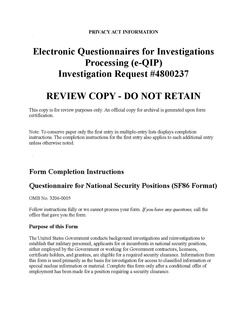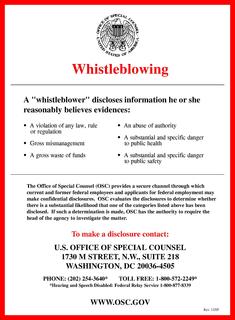A security clearance is a status granted to individuals allowing them access to classified information or to restricted areas, after completion of a thorough background check. The term "security clearance" is also sometimes used in private organizations that have a formal process to vet employees for access to sensitive information. A clearance by itself is normally not sufficient to gain access; the organization must also determine that the cleared individual needs to know specific information. No individual is supposed to be granted automatic access to classified information solely because of rank, position, or a security clearance.
A background check is a process a person or company uses to verify that an individual is who they claim to be, and this provides an opportunity to check and confirm the validity of someone's criminal record, education, employment history, and other activities from their past. The frequency, purpose, and legitimacy of background checks varies among countries, industries, and individuals. An employment background check typically takes place when someone applies for a job, but it can also happen at any time the employer deems necessary. A variety of methods are used to complete these checks including comprehensive database search and personal references.
Yankee White is an administrative nickname for a background check undertaken in the United States of America for Department of Defense personnel and contractor employees working with the president and vice president. Obtaining such clearance requires, in part, a Single Scope Background Investigation (SSBI) which is conducted under the manuals of the U.S. Defense Counterintelligence and Security Agency.

The United States Office of Personnel Management (OPM) is an independent agency of the United States Federal Government that manages the US civilian service. The agency provides federal human resources policy, oversight and support, and tends to healthcare (FEHB) and life insurance (FEGLI) and retirement benefits for federal government employees, retirees and their dependents.
The excepted service is the part of the United States federal civil service that is not part of either the competitive service or the Senior Executive Service. It provides streamlined hiring processes to be used under certain circumstances.
The United States government classification system is established under Executive Order 13526, the latest in a long series of executive orders on the topic beginning in 1951. Issued by President Barack Obama in 2009, Executive Order 13526 replaced earlier executive orders on the topic and modified the regulations codified to 32 C.F.R. 2001. It lays out the system of classification, declassification, and handling of national security information generated by the U.S. government and its employees and contractors, as well as information received from other governments.
A Single Scope Background Investigation (SSBI) is a type of United States security clearance investigation. It involves investigators or agents interviewing past employers, coworkers and other individuals associated with the subject of the SSBI. It is governed by the U.S. Intelligence Community Policy Guidance Number 704.1.
The United States federal civil service is the civilian workforce of the United States federal government's departments and agencies. The federal civil service was established in 1871. U.S. state and local government entities often have comparable civil service systems that are modeled on the national system, in varying degrees.

Executive Order 13087 was signed by U.S. President Bill Clinton on May 28, 1998, amending Executive Order 11478 to prohibit discrimination based on sexual orientation in the competitive service of the federal civilian workforce. The order also applies to employees of the government of the District of Columbia, and the United States Postal Service. However, it does not apply to positions and agencies in the excepted service, such as the Central Intelligence Agency, National Security Agency, and the Federal Bureau of Investigation.
The FBI Name Check is a background check procedure performed by the Federal Bureau of Investigation for federal agencies, components within the legislative, judicial, and executive branches of the federal government; foreign police and intelligence agencies; and state and local law enforcement agencies within the criminal justice system. The FBI Name Check is performed by the FBI as a part of the National Name Check Program, which dates back to Executive Order 10450 that was issued during the Eisenhower Administration. The FBI Name Check for an individual involves a search of the FBI's Central Records System Universal Index for any appearance of the name of the individual, as well as close phonetic variants and permutations of that name, in any of the records stored in the Universal Index. If any such occurrences are found, the Name Check also involves retrieval and analysis of the relevant paper and electronic files from local FBI offices and from other law-enforcement agencies.

e-QIP is a secure website managed by OPM that is designed to automate the common security questionnaires used to process federal background investigations. e-QIP was created in 2003 as part of the larger e-Clearance initiative designed to speed up the process of federal background investigations conducted by OPM's Federal Investigative Services (FIS). e-QIP is a front end data collection tool that has automated the SF-86, questionnaire for national security investigations as well as the SF-85P, the questionnaire for public trust positions. e-QIP allows applicants for federal jobs to enter, edit and submit their investigation data over a secure internet connection to their sponsoring agency for review and approval.

A whistleblower is a person who exposes any kind of information or activity that is deemed illegal, unethical, or not correct within an organization that is either private or public. The Whistleblower Protection Act was made into federal law in the United States in 1989.

Executive Order 12968 was signed by U.S. President Bill Clinton on August 2, 1995. It established uniform policies for allowing employees of the federal government access to classified information. It detailed standards for disclosure, eligibility requirements and levels of access, and administrative procedures for granting or denying access and for appealing such determinations. It expanded on the President Dwight D. Eisenhower's Executive Order 10450 of 1953.
Criminal records in the United States contain records of arrests, criminal charges and the disposition of those charges. Criminal records are compiled and updated on local, state, and federal levels by government agencies, most often law enforcement agencies. Their primary purpose is to present a comprehensive criminal history for a specific individual.
USIS was a US corporation that provided security-based information and service solutions to both government and corporate customers, in the United States and abroad. Its corporate headquarters were in Falls Church, Virginia, in Greater Washington, D.C. Training took place in Boyers, Pennsylvania. USIS was a part of Altegrity Inc., a company headquartered in the Falls Church area that was owned by Providence Equity Partners.
In the United Kingdom, government policy requires that staff undergo security vetting in order to gain access to government information.

The Intelligence Authorization Act for Fiscal Year 2014 is a U.S. public law that authorizes appropriations for fiscal year 2014 for intelligence activities of the U.S. government. The law authorizes there to be funding for intelligence agencies such as the Central Intelligence Agency or the National Security Agency, but a separate appropriations bill would also have to pass in order for those agencies to receive any money.
In June 2015, the United States Office of Personnel Management (OPM) announced that it had been the target of a data breach targeting personnel records. Approximately 22.1 million records were affected, including records related to government employees, other people who had undergone background checks, and their friends and family. One of the largest breaches of government data in U.S. history, information that was obtained and exfiltrated in the breach included personally identifiable information such as Social Security numbers, as well as names, dates and places of birth, and addresses. State-sponsored hackers working on behalf of the Chinese government carried out the attack.
The US Department of Commerce Office of Security is a division of the United States Department of Commerce (DOC) that works to provide security services for facilities of the department. Its aim is to provide policies, programs, and oversight as it collaborates with facility managers to mitigate terrorism risks to DOC personnel and facilities, program managers to mitigate espionage risks to DOC personnel, information, and facilities, and Department and Bureau leadership to increase emergency preparedness for DOC operations.





